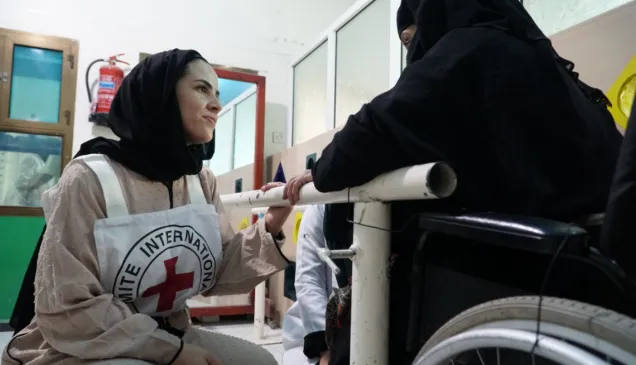25th session, Human Rights Council
The International Committee of the Red Cross would like to offer some insight into the lessons learned and the continuing challenges in preventing and responding to sexual violence against women, girls, men and boys in the Democratic Republic of the Congo and, more specifically, in the provinces of North and South Kivu.
Rape and other forms of sexual violence can be widespread in armed conflict, despite the fact that international humanitarian law absolutely prohibits these acts in both international and non‑international armed conflict.
Many victims do not report attacks owing to feelings of guilt or shame, fear of retaliation, or taboos. Yet sexual violence in the DRC is a common phenomenon with grave and dehumanizing effects on victims, their families and entire communities.
The ICRC is committed to offering victims assistance aimed at better prevention and mitigation of the consequences of sexual violence. From previous experience, the ICRC knows that a priority issue for many victims is access to medical and psychosocial care. The ICRC is also aware that activities aimed at responding to and preventing sexual violence in the DRC must be tailored to local communities, so as to provide culturally sensitive and effective support and promote long-term community-based approaches.
Thus, in 2006 the ICRC formed partnerships with several local organizations which today run approximately 40 "Maisons d'écoute" (literally "listening houses") in the provinces of North and South Kivu. They offer psychosocial care combined with other services, such as referral to medical facilities and economic assistance, which support victims of violence throughout the process of recovery. As the Maisons d'écoute had already developed active community support networks in various parts of the region, the ICRC recognized their value as entry points enabling victims and the communities from which they came to access care and assistance which would have a positive impact on their lives.
Cooperation with grassroots associations - The ICRC's aim is to set up self‑sufficient support centres by training local men and women from the community who respect and apply the principles of integrity, impartiality and neutrality in their efforts to reduce the long‑term impact of sexual violence on victims. Victims can seek care in a safe environment where they receive completely confidential psychosocial and material support.
Persons working in these centres are trained to hold regular awareness-raising activities to educate local communities about the consequences of sexual violence for victims, their families and their communities. These activities help to change preconceptions of sexual violence, reduce the stigmatization of victims and inform the local population about the services offered by the centres.
ICRC multidisciplinary approach – Its experience has taught the ICRC that programmes need to be multidisciplinary if they are to respond to victims' wide variety of medical, psychological, social and/or economic needs. In addition to receiving psychosocial support, victims are referred to health structures to receive specialized medical treatment, while the most vulnerable may also receive emergency economic assistance.
Our impact – In 2013, an ICRC evaluation of the Maisons d'ecoute revealed the positive impact that their services have had on victims and communities. They are perceived by victims as a place where they can seek immediate help and share their experiences frankly and confidentially in a safe environment. Changes in local attitudes in various communities, such as less stigmatization of victims and an increasing number of victims seeking assistance reflect the effectiveness of the awareness-raising campaigns and the overall benefits of this system for these Congolese communities.
However, despite these positive achievements, continuing, widespread sexual violence in the DRC still has devastating short and long-term consequences for the victims.
Consequently, the ICRC wishes to stress its commitment to assisting and protecting victims of sexual violence in the DRC and thanks the Chairman for giving the ICRC the floor during this important dialogue.

